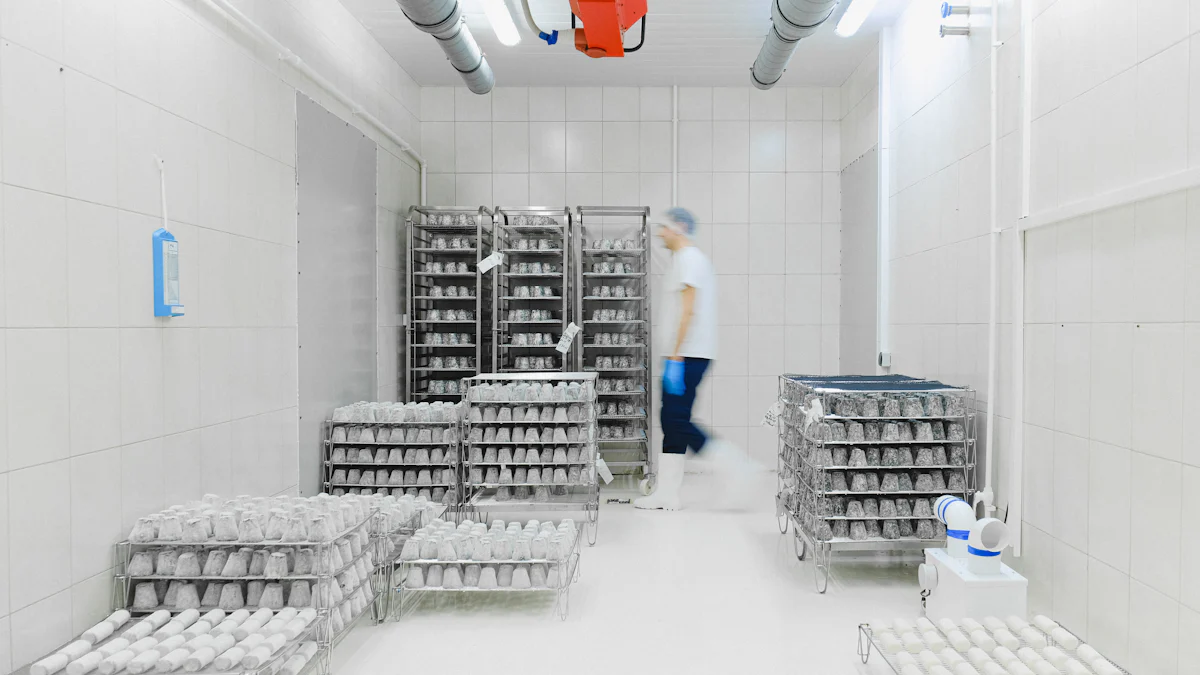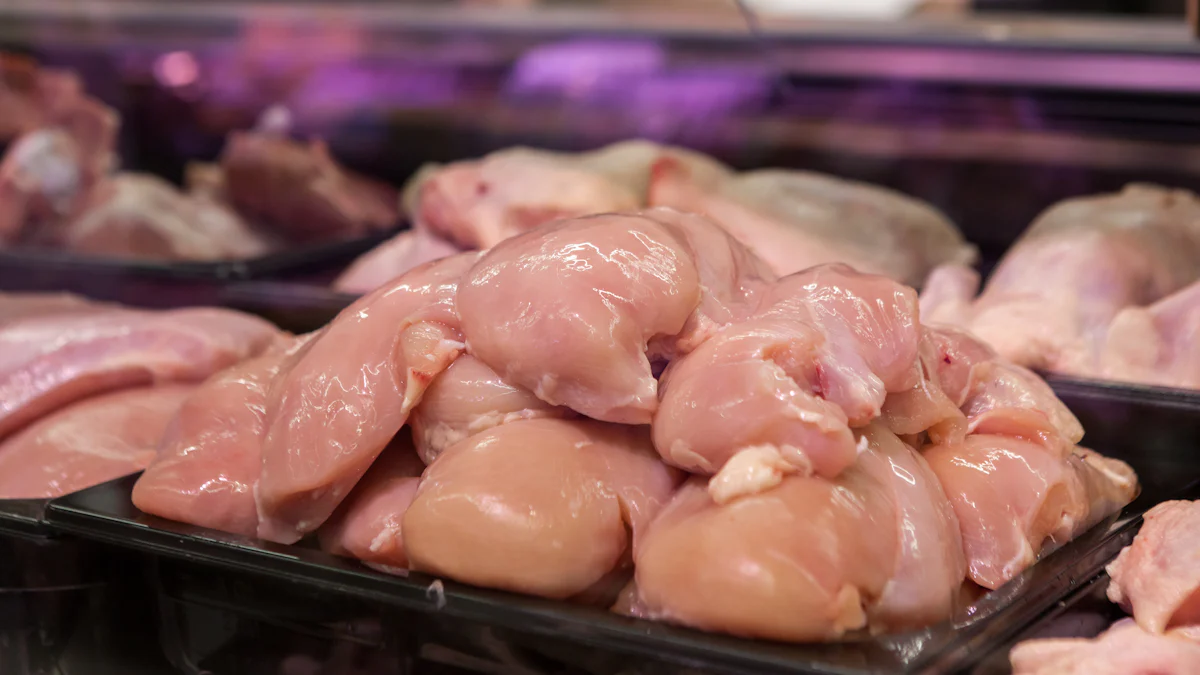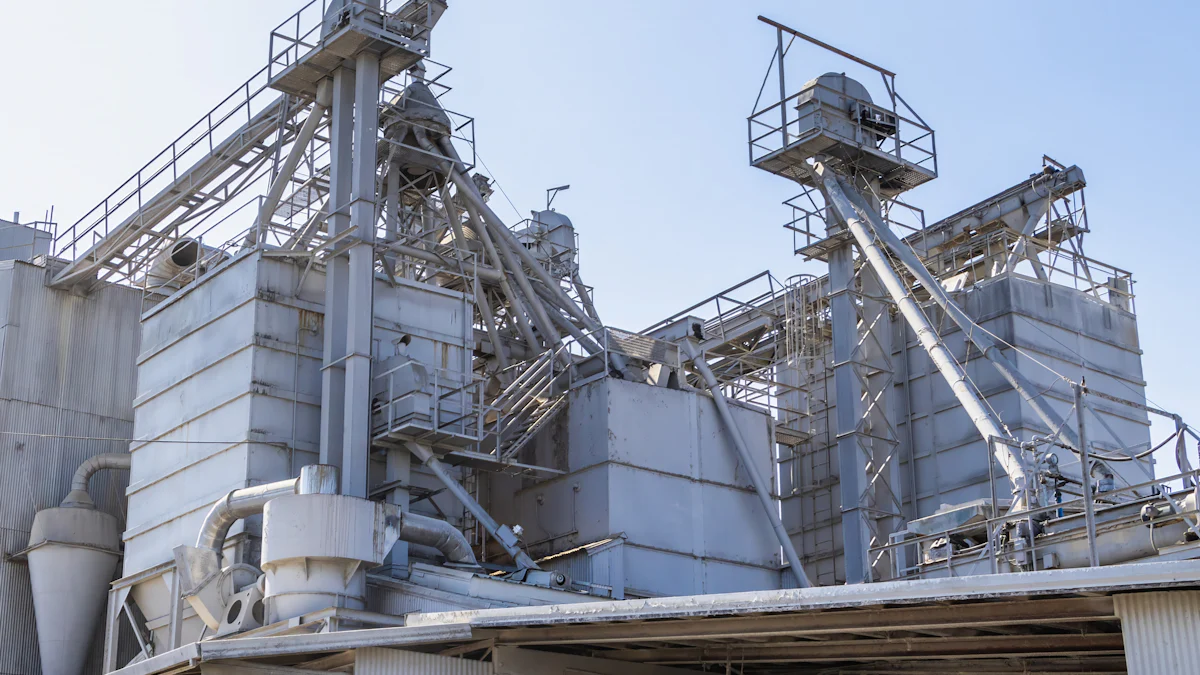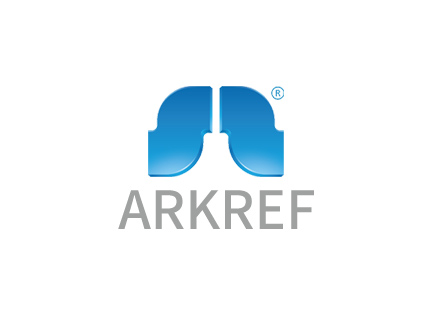Understanding Chicken Freezing Tunnels and Their Role in Poultry Processing

Chicken freezing tunnels play a vital role in poultry processing. These advanced systems rapidly freeze chicken to maintain its quality and ensure food preservation. Quick freezing prevents large ice crystals from forming, preserving the texture and flavour of the meat. This process also inhibits bacterial growth, enhancing food safety and extending shelf life.
Types of Chicken Freezing Tunnels

IQF Freezing Tunnel
The IQF freezing tunnel, short for Individually Quick Frozen, is a cutting-edge technology designed to freeze small pieces of food individually. This method uses rapid cold air circulation to freeze each piece of poultry separately. It prevents large ice crystals from forming, preserving the texture and quality of the meat. IQF freezing tunnels are ideal for chicken cuts, such as wings or drumsticks, as they allow easy portion control.
Key features of IQF freezing tunnels include:
Rapid freezing through cold air circulation.
Prevention of ice crystal formation for better texture.
Suitability for small items like chicken portions.
Blast Freezing Tunnel
Blast freezing tunnels use powerful cold air blasts to freeze poultry in bulk. This method is highly efficient for freezing large quantities, such as whole chickens or pallets of processed poultry products. While it may allow slightly larger ice crystals to form compared to IQF systems, it still ensures excellent quality preservation.
Advantages of blast freezing tunnels include:
Rapid freezing reduces bacterial growth, enhancing food safety.
Retention of freshness and extended shelf life.
Energy-efficient designs lower operational costs.
Advantage | Description |
|---|---|
Quality | Rapid freezing reduces large ice crystal formation, preserving texture and original quality. |
Freshness | Quick freezing retains freshness, leading to an extended shelf life for consumers. |
Safety | Controlled freezing environment lowers bacterial growth, enhancing food safety. |
Efficiency | Energy-efficient design results in lower energy costs compared to traditional methods. |
Cryogenic Freezing Tunnel
Cryogenic freezing tunnels utilise liquid nitrogen or carbon dioxide to achieve ultra-low temperatures. This method freezes poultry products almost instantly, locking in freshness and quality. Cryogenic systems are particularly effective for high-value processed poultry products.
Cryogenic freezing proponents suggest precooling products before they enter mechanical freezers, which may save around 5% for wet vegetables. However, the efficiency of cryogenic systems remains debated due to potential shrinkage and moisture loss at extremely low temperatures.
Cryogenic freezing tunnels offer unparalleled freezing speed but may consume more energy than other systems. Despite this, they remain a preferred choice for preserving delicate poultry products.
Applications of Chicken Freezing Tunnels in Poultry Processing
Freezing Whole Chickens
Chicken freezing tunnels are essential for freezing whole chickens efficiently. These systems ensure quick freezing of poultry, preserving its freshness and quality. By rapidly lowering the temperature, they prevent bacterial growth and maintain the texture of the meat. Tunnel freezers play a pivotal role in meat processing, ensuring that whole chickens remain fresh from the processing stage to consumer delivery. Their consistent and efficient freezing capabilities are crucial for food safety and operational efficiency.
Key benefits of freezing whole chickens in poultry freezing machines include:
Retention of freshness and quality.
Prevention of bacterial contamination.
Extended shelf life for consumers.
Freezing Chicken Cuts and Portions
Chicken freezing tunnels excel at freezing smaller portions, such as wings, drumsticks, or fillets. Individually quick frozen technology ensures that each piece is frozen separately, maintaining its texture and quality. Tunnel freezers use a continuous in-line-belt system to minimise product weight loss and ensure gentle handling during the freezing process. Inside the freezing zone, cold air circulates at high speed, achieving uniform freezing. This process reduces the formation of large ice crystals, preserving the cellular structure of the chicken cuts.
Uniform freezing offers several advantages:
Consistent quality across all portions.
Reduced risk of texture damage.
Enhanced portion control for packaging and distribution.
Freezing Processed Poultry Products
Processed poultry products, such as nuggets or patties, require precise freezing to maintain their quality. Freezing should occur immediately after manufacturing and packaging to preserve freshness. High-volume operators often use freezing tunnels or spiral freezers, which can freeze products in 15 to 45 minutes. Reaching the optimal freeze point is essential to prevent enzyme activity that could degrade fat and protein. However, challenges such as high equipment costs and space requirements must be addressed to optimise operations.
Despite these challenges, freezing tunnels remain indispensable for processed poultry products. They ensure rapid freezing, preserve product quality, and meet the demands of high-volume production.
Benefits of Using Industrial Poultry IQF Freezers

Enhanced Food Safety and Quality
Industrial poultry IQF freezers play a crucial role in ensuring the safety and quality of poultry products. The individually quick frozen process rapidly reduces the temperature of chicken and other poultry items, minimising the risk of bacterial growth and contamination. This method also prevents freezer burn, which helps maintain the texture and flavour of the meat over time.
IQF freezing tunnel technology preserves the natural structure of poultry by preventing the formation of large ice crystals. This ensures that the meat retains its original quality, making it ideal for both fresh and processed poultry products. Additionally, the precise freezing process allows for consistent portion sizes, which is essential for maintaining uniformity in packaging and distribution.
Improved Operational Efficiency
Poultry IQF freezers significantly enhance operational efficiency in poultry processing plants. Their innovative design enables quick and individual freezing of poultry products, which speeds up the production process. These freezers are constructed from durable stainless steel, ensuring reliable performance over extended periods.
The advanced technology used in IQF freezing tunnels also reduces energy consumption while maintaining high-quality freezing standards. Their easy-to-clean design ensures compliance with food safety regulations, making them a preferred choice for poultry processors. By streamlining operations, these freezers help businesses meet high production demands without compromising on quality.
Energy Savings and Cost-Effectiveness
The advantages of IQF poultry freezers extend to energy savings and cost-effectiveness. Automation reduces the need for manual labour, leading to lower operational expenses. These freezers optimise energy consumption, which helps reduce electricity costs. Their advanced technology also minimises maintenance requirements, saving money on repairs and downtime.
IQF freezing technology ensures better food preservation by locking in the texture, taste, and nutritional value of poultry products. This reduces food waste and improves inventory management. Additionally, the extended shelf life of IQF products supports a consistent supply chain, reducing spoilage risks and ensuring customer satisfaction.
Poultry processors benefit from the cost-saving features of IQF freezers, which outperform traditional freezing methods in terms of speed, efficiency, and quality preservation.
Optimising the Use of Poultry IQF Freezers
Regular Maintenance and Cleaning
Proper maintenance and cleaning are essential for ensuring the optimal performance of poultry IQF freezers. Regular cleaning prevents contamination, which is critical for maintaining food safety standards. Dust, grease, and residue can accumulate on the equipment, reducing efficiency and increasing the risk of bacterial growth. Cleaning schedules should align with the operational demands of the facility.
Routine maintenance also plays a vital role in keeping the iqf freezing tunnel running efficiently. Technicians should inspect components such as fans, belts, and refrigeration units to identify wear and tear. Replacing damaged parts promptly can prevent costly breakdowns. Maintenance logs help track performance and ensure that all tasks are completed on time.
Monitoring Temperature and Airflow
Temperature and airflow monitoring are crucial for consistent freezing quality in poultry processing. The iqf freezing tunnel relies on precise temperature control to freeze products quickly and evenly. Any fluctuation in temperature can compromise the texture and safety of the poultry.
Airflow within the freezer must remain unobstructed to ensure uniform freezing. Blocked vents or improperly positioned products can disrupt the freezing process. Operators should regularly check airflow patterns and adjust product placement as needed. Advanced monitoring systems can provide real-time data, allowing for immediate corrective actions.
Training Staff for Proper Operation
Well-trained staff are essential for the efficient operation of poultry IQF freezers. Employees must understand the equipment's functionality and the importance of maintaining optimal conditions. Training programmes should cover topics such as cleaning procedures, temperature monitoring, and troubleshooting common issues.
Hands-on training sessions can improve staff confidence and competence. Operators who understand the freezing process can identify potential problems early, reducing downtime and maintaining product quality. Continuous education ensures that employees stay updated on the latest technologies and best practices in poultry processing.
Chicken freezing tunnels play a pivotal role in poultry processing by ensuring food safety, quality, and operational efficiency. Their rapid freezing capabilities preserve the texture, flavour, and nutritional value of poultry while inhibiting bacterial growth. These systems meet industry demands by maintaining high product standards, reducing contamination risks, and supporting continuous production with minimal downtime.
See Also
Grasping How Industrial Freezing Tunnels Operate Effectively
Rapid Freezing Tunnels Revolutionising The Food Sector
Unveiling The Major Advantages Of Tunnel Freezers

